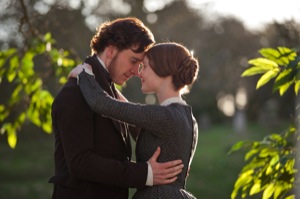
In the last 100 years, there have been 19 films based on Charlotte Bronte’s classic 1847 novel Jane Eyre. Yes, 19. The director of the most recent, Cary Fukunaga, joked in The New York Times last week that a new version has to be made every five years.
I must admit, however, that despite the number of film versions, some of which are considered classics, I’ve never seen any of them until I saw Fukunaga’s. And, worse, I haven’t read the novel. So, this either means I’m a philistine or it means that I actually have a fresh eye with which to critique this new Jane Eyre. I think it’s wonderful: a gorgeous and moving love story.
A number of the plot points in Jane Eyre are now classic tropes of modern love stories. Jane (Mia Wasikowska) is an orphan taken in, and then hated by her wealthy, cruel aunt. She is sent to a horrible, brutal boarding school, where she grows up and learns, against her will, to be subservient.
Eventually, she is hired to be the governess for a French girl who is the ward of Edward Rochester (Michael Fassbender), a rich and quite cranky man who only occasionally visits the massive and very, very creepy estate where Jane and the girl live. (In fact, Fukunaga’s Jane Eyre is scarier than Red Riding Hood.)
But when Rochester does visit, he notices that Jane is more than a mousey governess. While haughty and suspicious, she’s also kind, talented, and, when prompted, can match him wit for wit. They fall in love. And then major complications ensue, and Jane and Rochester are kept apart.
A classic heterosexual love story, it is also a proto-feminist one, and Jane Eyre speaks to anyone who has been unfairly kept from who they love because of status, manners, propriety and old-fashioned expectations of how men and women must behave.
While the book, like many epic British novels of the Victorian era, is quite long and intricately plotted, Fukunaga’s Jane Eyre is smartly taut, with Moira Buffini’s screenplay restructuring the telling of the plot without losing any of its themes or power. Fukunaga also retains the beauty of Bronte’s prose, not by using voice-over but by shooting the movie with literary precision: exquisitely detailed costumes, moody cinematography and scenes as rhythmically paced as any great novel.
But a movie like Jane Eyre is going to succeed or fail with its Jane and its Rochester. Wasikowska, who was the eponymous Alice in Wonderland and the daughter in The Kids Are All Right, is pale and plain but still radiates a quiet beauty. Like a great actress of much more experience, she communicates with the subtlest of movements a storm of emotions behind her carefully constrained facial expressions. But when Rochester brings her out of her shell, she is, to use a very modern term, quite snarky.
This charms Rochester, played by Michael Fassbender, who most people in the United States know only from playing a dapper, doomed British officer in Inglourious Basterds. While Rochester is in some ways an ass – angry, arrogant and bitter – he is also dutiful, mostly honorable and capable of all sorts of aristocratic charm. Fassbender easily shifts back and forth between all of these qualities while also being as sexy as any Victorian man on screen since Jeremy Northam in the 1996 version of Emma.










